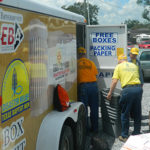I am a Christian because of the ministry of two "laymen." One was a mechanic, the other a salesman. When I was a teenager, they invited me to ride their bus to church. If they had not knocked on my door, I would never have knocked on theirs. They were my first ministers, missionaries and evangelists. I will forever be grateful for their theology of work.

Jim Denison
|
Fortunately, they rejected two lies imbedded in the foundation of Western culture. As Labor Day approaches, let's separate deception from truth and construct a biblical theology of work that will transform us on Sunday and empower us on Monday.
Lie 1: The separation of church and state means the separation of faith and work.
When God created our planet, he "saw all that he had made, and it was very good" (Genesis 1:31, NIV). He then invited us to partner with him in his continuing work of creation.
Scripture is the story of a divine-human collaboration that continues today. God planted the Garden of Eden, then put man there "to work it and take care of it" (Genesis 2:15). The Lord sent the flood but first called Noah to build the ark. He parted the Red Sea but first instructed Moses to raise his rod over its waters. He demolished the walls of Jericho but first required his people to march around them.
I don't know all the reasons why the omnipotent Maker of the universe has chosen to collaborate with his finite, fallen creation, but he has. We are "God's fellow workers" (2 Corinthians 6:1).
Tragically, our culture has exchanged this fulfilling, holistic view of life and work for a spiritual schizophrenia we learned from ancient Greek civilization. Their gods lived atop Mount Olympus, removed from the cares of life below. Their subjects placated them with offerings meant to secure their favor and provision.
The Greeks embraced a transactional religion—if we honor the gods, they will honor us. No one wanted an intimate, personal relationship with such capricious deities. The "sacred" temple was separate from the "secular" world. The priests had their lives, while the rest of us had ours.
Sign up for our weekly edition and get all our headlines in your inbox on Thursdays
When Christianity spread beyond its Jewish roots into this Greco-Roman culture, over time it adopted this sacred/secular dichotomy. By 250 A.D., Cyprian of Carthage had coined "clergy" (the "called-out"), to be separated from the "laity" (from the Greek laos, the common people).
Eusebius' Demonstratio Evangelica (318 A.D.) articulated this double standard of life. Those who would be "perfect" with God must separate themselves from worldly interests and enjoyments, while those who remain in the world live in second-class piety. Medieval Catholicism embraced this worldview, segregating the monastic "religious" from the worldly commoners.
Fortunately for me, the men who knocked on my door that Saturday morning in August, 1973, did not know they were not "ministers." They thought God had called them to use their abilities and experience to serve and extend his kingdom. They were right.
Lie 2: We are what we do.
The Industrial Revolution took Western civilization from its medieval agrarian culture into an urbanized, mechanized world. In so doing, it made workers a means to an end, employees of corporations for whom their labor served the institutional bottom line.
Our worth soon was defined by our production. The harder we work, the more we progress and the more valuable we become. As the modern economy enabled us to build homes and purchase commodities our ancestors could not have imagined, we learned to measure ourselves by what we do and how much we own.
By contrast, Scripture teaches our self-worth is found not in our production but in our identity as God's beloved. No matter our past (Galatians 3:26-29), all believers are children of one Father. He has a "good, pleasing, and perfect will" for our lives and work (Romans 12:2). He expects us to fulfill our calling "with all your might" (Ecclesiastes 9:10) in the service of our Lord: "Whether you eat or drink or whatever you do, do it all for the glory of God" (1 Corinthians 10:31).
In the Bible, God is a king. Jesus initiated his ministry by calling us into the kingdom (Matthew 4:17). He taught us to seek and serve first this kingdom (Matthew 6:33) and to pray that our king's will be done on earth as in heaven (Matthew 6:10). If God is your king, you're wearing his clothes, breathing his air and walking on his planet. Everything you do is a product of his provision and is to be done for his glory.
The men who invited me to their church measured success by obedience. Their careers did not elevate them to the pinnacles of cultural acclaim, but their faithfulness will echo for eternity. They proved Alfred North Whitehead right: Great people plant trees they'll never sit under.
When we view our work as part of God's continued creation and measure success by obedience to his kingdom call, every dimension of our lives is transfused with purpose and significance. Monday becomes as "sacred" as Sunday. And two businessmen knocking on doors become ambassadors of the King of Kings.
Charles Mayo, one of the founders of the world-famous Mayo Clinic, posted a sign beside his desk that read, "There is no fun like work." Do you agree?
Jim Denison is president of the Denison Forum on Truth and Culture and theologian-in –residence with the Baptist General Convention of Texas.














We seek to connect God’s story and God’s people around the world. To learn more about God’s story, click here.
Send comments and feedback to Eric Black, our editor. For comments to be published, please specify “letter to the editor.” Maximum length for publication is 300 words.